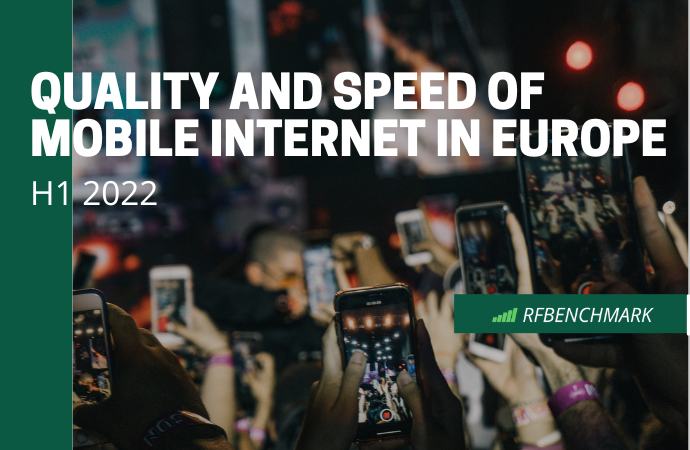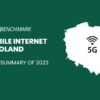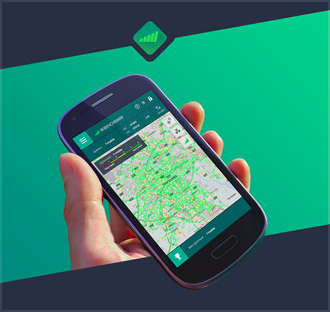Despite the global socio-economic challenges that we have had to face in recent months, the rapid development of mobile technologies continues. In many countries, the development of 5G networks has become crucial and strategic investments in telecommunications infrastructure are being made.
An important element of any change is monitoring its effects. That is why we decided to check what the quality and speed of mobile Internet looked like in the first half of 2022 in selected countries of the European Economic Area.
In our study, the results for both 4G and 5G technologies were taken into account, and the data source are the measurements of the RFBENCHMARK mobile application users.
Average data download speed: Austria (72.97 Mbps)
In the ranking of 25 European countries, Austria took the lead in the most media-hyped category of the average data download speed. This country was clearly ahead of the Scandinavian countries: Denmark with a result of 71.64 Mbps and Norway with a result of 67.91 Mbps, as well as the Netherlands with a result of 70.85 Mbps.
Countries such as Portugal, Spain, and Greece came last.
Average data upload speed: Belgium (47.45 Mbps)
The winner of the next category is to be found among the Benelux countries. It is Belgium, with a result of 47.45 Mbps, that can boast the best average data upload speed. Here, too, it has a very clear advantage over the next countries – Slovenia (30.83 Mbps) and Denmark (23.81 Mbps).
Ping: Bulgaria (20 ms)
In terms of statistics for the lowest average ping value, the countries of Central and Eastern Europe top the table. The leader of the ranking is Bulgaria (20 ms), ahead of Slovakia and the Baltic countries (Estonia – 23 ms, Latvia – 23.75 ms).
READ ALSO: Quality and Speed of Mobile Internet in Poland (October 2022)
| Country | Data download | Data upload | Ping |
|---|---|---|---|
| Austria | 72.97 Mbps | 21.06 Mbps | 39 ms |
| Belgium | 47.45 Mbps | 10,04 Mbps | 34 ms |
| Bulgaria | 59.1 Mbps | 13.3 Mbps | 20 ms |
| Croatia | 42.82 Mbps | 15.77 Mbps | 27.29 ms |
| Cyprus | n/a | n/a | n/a |
| Czech Republic | 33 Mbps | 9.84 Mbps | 47.29 ms |
| Denmark | 71.64 Mbps | 23.81 Mbps | 32.91 ms |
| Estonia | 54.9 Mbps | 11.6 Mbps | 23 ms |
| Finland | 59.88 Mbps | 11.34 Mbps | 41.99 ms |
| France | 40.9 Mbps | 14.45 Mbps | 53.6 ms |
| Germany | 49.8 Mbps | 9.09 Mbps | 44.83 ms |
| Greece | 23.86 Mbps | 7.82 Mbps | 42.71 ms |
| Hungary | 31.59 Mbps | 13.57 Mbps | 30.97 ms |
| Iceland | n/a | n/a | n/a |
| Ireland | 22.58 Mbps | 9.38 Mbps | 47.49 ms |
| Italy | 32.83 Mbps | 16.71 Mbps | 39.84 ms |
| Latvia | 47.11 Mbps | 6.29 Mbps | 23.75 ms |
| Liechtenstein | n/a | n/a | n/a |
| Lithuania | 30.42 Mbps | 6.34 Mbps | 55.42 ms |
| Luxembourg | n/a | n/a | n/a |
| Malta | n/a | n/a | n/a |
| The Netherlands | 70.85 Mbps | 15.14 Mbps | 35.54 ms |
| Norway | 67.91 Mbps | 11.48 Mbps | 54.84 ms |
| Poland | 35.08 Mbps | 19.51 Mbps | 32.86 ms |
| Portugal | 9.21 Mbps | 9.59 Mbps | 33.86 ms |
| Romania | 32.2 Mbps | 11.4 Mbps | 38.07 ms |
| Slovakia | 41.4 Mbps | 10.2 Mbps | 21 ms |
| Slovenia | 52.31 Mbps | 30.83 Mbps | 28.39 ms |
| Spain | 17.31 Mbps | 8.66 Mbps | 63.45 ms |
| Sweden | 54.9 Mbps | 16.33 Mbps | 46.19 ms |
How did we collect data for the ranking?
The measurements are collected from the users of our mobile app. It allows us to measure basic mobile network parameters – including signal level and quality depending on the technology used by the mobile device, information about the mobile network operator, or the country where the smartphone is located. In addition, on-demand measurements of data download and upload speeds, as well as a latency test, are performed. When the app notices a low-quality voice call, lack of mobile Internet service, or other services, it has the ability to report the user’s current position where the problem occurred.














Leave a Comment
Your email address will not be published. Required fields are marked with *